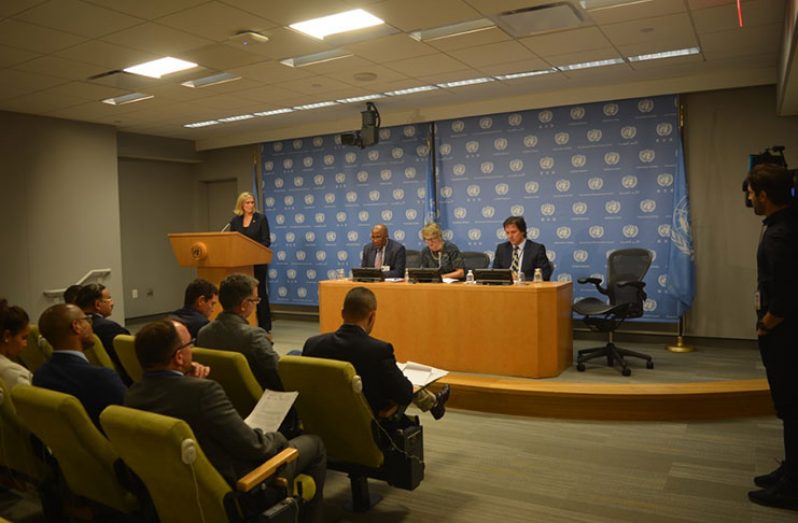…Guyana among low and middle income countries to benefit
By Svetlana Marshall in New York
GUYANA is among more than 90 low and middle income countries that will be able benefit from a new high-quality antiretroviral therapy at a reduced cost.
At a press conference on Thursday at the United Nations Headquarters in New York, international players in the global fight to achieve the UN’s 90-90-90 treatment targets for persons living with HIV, announced that they have been able to strike a ground-breaking agreement that will accelerate the availability of the first affordable, generic, single-pill HIV treatment regimen containing dolutegravir (DTG).
With the agreement in place, public sector purchasers in low and middle income countries will be able to access the single-pill HIV treatment from 2018 at around US$75 per person, per year.
DTG, is recommended by the World Health Organisation (WHO) as an alternative first-line HIV regimen. In July 2017, WHO issued guidance to countries on how to safely and rapidly transition to DTG-based antiretroviral treatment.
The announcement was made by the Governments of South Africa and Kenya, together with the United Nations Programme on HIV/AIDS (UNAIDS), the Clinton Health Access Initiative (CHAI), the Bill & Melinda Gates Foundation (BMGF), Unitaid, the United Kingdom’s Department for International Development (DFID), the United States President’s Emergency Plan for AIDS Relief (PEPFAR), the U.S. Agency for International Development (USAID), and the Global Fund to Fight AIDS, Tuberculosis and Malaria.
According to the leaders in the health sector, the agreement is a critical step towards ensuring the availability of worldwide high-quality treatment for HIV.
Most importantly, it is expected to accelerate treatment rollout as part of global efforts to reach all 36.7 million people living with HIV with high-quality antiretroviral therapy. UNAIDS estimates that in 2016, just over half (19.5 million) of all people living with HIV had access to the lifesaving medicines.
In his remarks, UNAIDS Executive Director, Michel Sidibé, said it was a lifetime announcement, noting that the agreement will improve the quality of life for millions of people living with HIV in 92 countries across the world.
“What we are talking about today is a life changing announcement. It’s about the quality of medicine, it’s about equity, it’s about dignity, it’s about access to medicine as a human right,” he told journalists.
Sidibé noted too that increased availability to treatments like DTG is critical to achieving the UN’s 2020 target.
“To achieve the 90-90-90 treatment targets, newer, affordable and effective treatment options must be made available—from Baltimore to Bamako—without any delay,” he stated.
For WHO, the agreement is a welcomed one.
“WHO welcomes this agreement which will make it possible to reach millions of people with better, more affordable and durable HIV drugs. This will save lives for the most vulnerable, bringing the world closer to the elimination of HIV. We congratulate South Africa, Kenya, CHAI and others on this landmark agreement. WHO will support countries in the safe introduction and a swift transition to this game-changing new treatment,” WHO Director-General, Dr. Tedros Adhanom stated.
This one pill, once-a-day generic fixed-dose combination of tenofovir disoproxil fumarate, lamivudine, and dolutegravir (TLD) was developed by Mylan and Aurobindo, under licensing agreements from ViiV Healthcare, the original developer of DTG.
BMGF, with the support of CHAI, recently completed ceiling price agreements with Mylan and Aurobindo with the goal of accelerating the availability of the new fixed-dose combination to the public sector. The agreements are expected to save public sector purchasers over US$1 billion over the next six years.
The ceiling price agreements apply to purchases for public sector use in all 92 countries covered under ViiV Healthcare’s dolutegravir licensing agreement, representing over 90 per cent of people in Low and Middle Income Countries currently living with HIV.
According to Global HIV Statistics, 36.7 million people were living with HIV in 2016, 19.5 of whom had access to antiretroviral therapy. In that year alone, 1.8 million people had gotten infected with HIV. Additionally, approximately one million people died from AIDS related illnesses in 2016.
In the Caribbean, there were 310, 000 people living with HIV in 2016, 18, 000 of whom were infected that same year. Also in 2016, 9,400 people died of AIDS-related illnesses in the Caribbean region.
In December 2016, the National AIDS Programme Secretariat had disclosed that 7000 persons were living with HIV in Guyana, the majority of whom were being treated.



.jpg)










